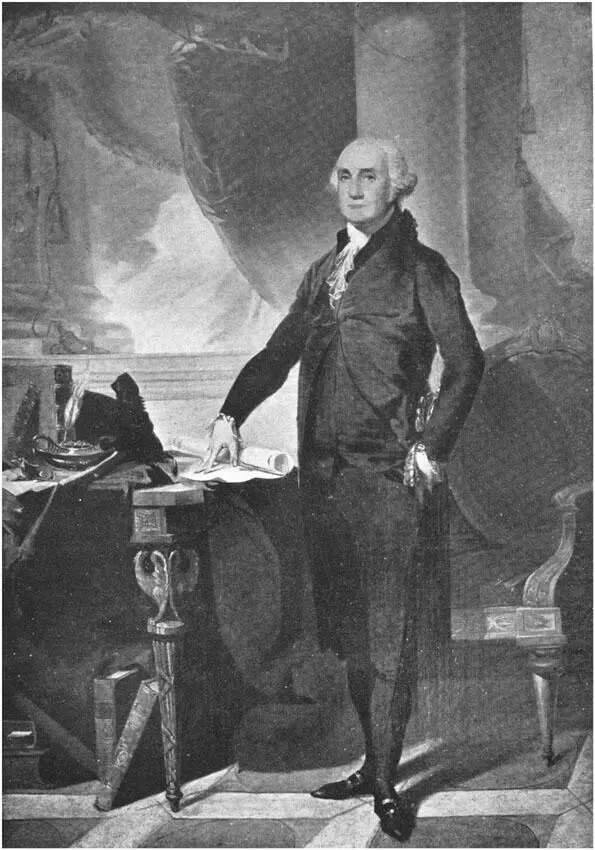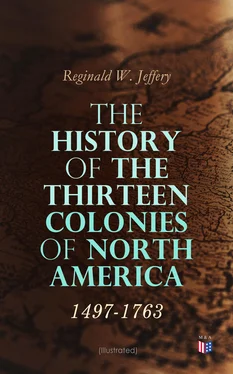Reginald W. Jeffery
The History of the Thirteen Colonies of North America: 1497-1763 (Illustrated)
Madison & Adams Press, 2020
Contact: info@madisonadamspress.com
EAN 4064066059699
This is a publication of Madison & Adams Press. Our production consists of thoroughly prepared educational & informative editions: Advice & How-To Books, Encyclopedias, Law Anthologies, Declassified Documents, Legal & Criminal Files, Historical Books, Scientific & Medical Publications, Technical Handbooks and Manuals. All our publications are meticulously edited and formatted to the highest digital standard. The main goal of Madison & Adams Press is to make all informative books and records accessible to everyone in a high quality digital and print form.
Preface PREFACE Table of Contents It has been my object in this small book to put into a handy form a short narrative of the History of the Thirteen Colonies. In the limited space at my command I have endeavoured to give as often as possible the actual words of contemporaries, hoping that the reader may thereby be tempted to search further for himself amongst the mass of documentary evidence which still needs so much careful study. I cannot send this book into the world without acknowledging my indebtedness to both the Beit Professor of Colonial History, Mr H. E. Egerton, and the Beit Lecturer on Colonial History, Mr W. L. Grant, whose kind suggestions have proved most valuable. At the same time I must thank Mr E. L. S. Horsburgh, for by his action the writing of this little work was made possible. R. W. J. Oxford, 1908
Chapter I. Introduction: Early English Voyages to North America
Chapter II. Virginia: The First Great Colony of the British
Chapter III. The Colonisation of Maryland and the Carolinas
Chapter IV. The Puritans in Plymouth and Massachusetts
Chapter V. Connecticut; Rhode Island and Providence Plantation; New Haven; Maine; New Hampshire
Chapter VI. The Fight with the Dutch for Their Settlement of New Netherland
Chapter VII. The Quaker Settlements and Georgia
Chapter VIII. The Social and Economic History of New England
Chapter IX. The Social and Economic History of the Southern and Middle Colonies
Chapter X. The French Colonies in North America
Chapter XI. French Aggression
Chapter XII. The Climax: The Struggle Between English and French Colonists
Chronology of Colonial History

GEORGE WASHINGTON
FROM THE PAINTING ATTRIBUTED TO GILBERT STUART IN THE NATIONAL PORTRAIT GALLERY.
Table of Contents
It has been my object in this small book to put into a handy form a short narrative of the History of the Thirteen Colonies. In the limited space at my command I have endeavoured to give as often as possible the actual words of contemporaries, hoping that the reader may thereby be tempted to search further for himself amongst the mass of documentary evidence which still needs so much careful study. I cannot send this book into the world without acknowledging my indebtedness to both the Beit Professor of Colonial History, Mr H. E. Egerton, and the Beit Lecturer on Colonial History, Mr W. L. Grant, whose kind suggestions have proved most valuable. At the same time I must thank Mr E. L. S. Horsburgh, for by his action the writing of this little work was made possible.
R. W. J.
Oxford, 1908
CHAPTER I
INTRODUCTION: EARLY ENGLISH VOYAGES TO NORTH AMERICA
Table of Contents
It would be out of place in this small book to give in detail a history of all the discoveries which were made along the shores of North and South America at the end of the fifteenth and beginning of the sixteenth centuries. As the main object is to depict briefly the political history of the Thirteen English Colonies on the North American seaboard, it will be unnecessary to say more than a few words about the discoverers whose enterprise and bravery made colonisation possible. With the Spanish, French, and Dutch voyagers it is not proposed to deal; their stories are well known, and affected but little the establishment of our early settlements in the West. Like the British nation, these three peoples also strove to create lasting empires in America; but unlike their rival, they failed. The Spaniards made the fatal error of attempting to settle during the period of exploration. They based their colonies upon slavery, and a mistaken commercial policy; and the sparseness of their colonists made them incapable of contending against the pressure of surrounding savagery. The result was that they, who were without the traditions of public morality and who were to a certain extent lacking in administrative powers, became intermixed with the inferior races with whom they came in contact. The French were no more successful in their endeavours to establish a New France beyond the sea; they failed, partly because of the French temperament, and partly through obvious errors. The French character was buoyant and cheerful—both excellent natural gifts for colonists—but they were unable to combine the spirit of adventure with that patient commercial industry which so wonderfully distinguished the Puritan emigrants. The Dutch might have proved serious rivals to the British in the West had they been able to rise from the position of mere traders, and had they had a sufficiently large population on which to draw. Their commercial system deteriorated, becoming uneconomic and non-progressive; while their arduous and gallant struggle against Philip II. and Alva had necessarily handicapped them in the race for colonial aggrandisement.
The English, in strong contrast to these competitors, never drew a distinct or sharp line between the soldier and the trader. The story of Great Britain's expansion contains the names of hundreds of gallant heroes, but they were at the same time sober and industrious men. The plodding and commercial characteristics possessed by the British colonial saved him from perpetrating those foolish errors of the Spaniard which arose from a desire to gain rapid wealth and a tawdry glory. One fact stands out pre-eminent amongst the reasons of British success—the English kept their period of exploration almost entirely separate from their epoch of settlement. The glorious dreams of Eldorado, the visions of the golden city of Manoa had been dispersed like a morning mist when the period of colonisation dawned bright and clear at the beginning of the seventeenth century.
The period which coincides with the reign of Henry VII. forms one of the greatest epochs of history; it was indeed the veritable Renaissance, the birth of the New World. It was at this moment that the history of America, the modern history of England, and the present history of Europe practically began. These startling facts were due to the simultaneous discoveries in the East and the West. The voyages of Bartholomew Diaz, of Christopher Columbus, and of Vasco de Gama might well have astonished the world, but seem to have had very little effect upon the English as a nation. England was not yet ready to take up the position of Mistress of the Seas; the time was not yet ripe for colonial advancement. The country, from both political and social points of view, was still suffering from the confusion and anarchy which had resulted from the rule of the Lancastrians, and from the chaos left by the Wars of the Roses. Two men, however, seem to have understood something of the possibilities that lay open to them in the West. John and his son Sebastian Cabot, of Genoese stock, but sometime resident in Venice, sailed, under the patronage of Henry VII., from Bristol, in 1497, to discover the island of Cathay. John Cabot is described as one who had "made himself very expert and cunning in knowledge of the circuit of the world and Ilands of the same, as by a Sea card and other demonstrations." 1The royal charter, granted to these men in March 1496, contained a most important clause, "to saile to all parts, countreys, and seas of the East, of the West, and of the North, under our banners and ensignes, ... to set up our banners and ensignes in every village, towne, castle, isle, or maine land of them newly found ... as our vassals, and lieutenants, getting unto us the rule, title, and jurisdiction of the same." 2Bacon, in his
Читать дальше













